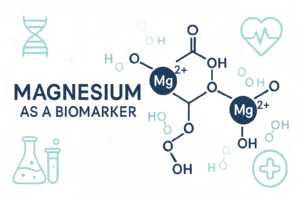Why Magnesium Matters for Brain and Emotional Wellness
Magnesium is an essential mineral that regulates over 300 biochemical processes in the human body, with a particularly profound influence on the brain, neurotransmitters, and the stress response system. Despite its importance, magnesium deficiency is surprisingly common worldwide—a gap with serious implications for mental health, mood, and cognitive performance[1][2][3].
This comprehensive guide explores:
– How magnesium impacts brain chemistry and emotional resilience.
– What current research reveals about magnesium for depression, anxiety, stress, and cognition.
– The best magnesium supplements for mental health, including dosing and safety guidelines.
– How to recognize magnesium deficiency symptoms linked to mood disorders.
– Practical, evidence-based strategies to optimize magnesium for your mental wellness.
Understanding Magnesium’s Biological Role in the Brain
Magnesium is a key player in the function of neurotransmitters like serotonin, dopamine, and glutamate that dictate mood, motivation, and stress tolerance[4][1][2]. It also regulates the hypothalamic-pituitary-adrenal (HPA) axis, the body’s central stress response system. Here’s how magnesium functions:
Neurotransmitter synthesis and balance:
Magnesium acts as a cofactor for enzymes that synthesize serotonin (“the happy hormone”) and dopamine (“the reward neurotransmitter”), both of which are vital for stable mood and mental clarity[4][1].
NMDA receptor modulation:
Magnesium modulates NMDA receptors—crucial for synaptic plasticity and neuroprotection—blocking the excess influx of calcium that, if unregulated, leads to “excitotoxicity,” neuronal stress, and cell damage[1].
Regulating the stress response:
By supporting proper HPA axis function, magnesium buffers the brain against chronic stress and excessive cortisol levels, reducing vulnerability to anxiety and depression[4][1].
Inflammation and oxidative stress reduction:
Magnesium deficiency increases inflammatory cytokines and oxidative stress, processes now well established as underlying mechanisms in depression, anxiety, and cognitive decline[4][1][5].
What Research Says About Magnesium and Mental Health
1. Magnesium and Depression
Multiple studies show that low magnesium levels are frequently seen in people struggling with depressive symptoms, and that supplementation may help improve depressive symptoms, especially in those who are deficient[4][2][3][5][6][7].
Clinical Trials:
A notable randomized trial involving 126 adults with mild-to-moderate depression used 248mg of elemental magnesium per day for six weeks. Results showed significant improvements in depression scores—often within two weeks—with high levels of safety and tolerability[7][8].
Systematic Review/Meta-Analysis:
A 2023 systematic review that pooled data from 7 clinical trials highlighted a significant reduction in depression scores with magnesium supplementation compared to placebo (standardized mean difference -0.919, p=0.001), supporting its adjunctive role in mental health management[6].
Example Outcomes:
– Fast improvement in mood within two weeks of supplementation[7].
– More pronounced benefits in those with low baseline magnesium or inadequate dietary intakes[6][8].
– Possible additional benefits for anxiety, insomnia, and fatigue when deficiency is corrected[3][5].
2. Magnesium’s Impact on Anxiety and Stress Response
Anxiety Disorders: While clinical data for anxiety is less robust, some studies found that magnesium can reduce symptoms in those with mild anxiety, particularly related to stress or poor sleep[1][8].
Stress: Magnesium supports GABAergic (calming) neurotransmission, helping buffer the brain against chronic stress and lowering the physical impact of psychosocial ordeals[2][3][9].
Sleep Quality: Magnesium may improve sleep—critical for mood—by regulating circadian rhythms and promoting relaxation[10][11].
3. Magnesium and Cognitive Function
Neuroprotection: Low magnesium has been associated with impaired memory and increased risk for age-related cognitive decline, including Alzheimer’s disease[4][1].
Synaptic Plasticity: Adequate magnesium ensures brain adaptability, learning, and memory formation are optimal, which is crucial for resilience in stressful environments[1][5].
Identifying and Treating Magnesium Deficiency: What Are the Signs?
Magnesium deficiency is hard to spot early, but several symptoms—especially when persistent—warrant attention and possible testing[3][5]:
Mental Health Related Signs of Magnesium deficiency
– Low mood or sudden, unexplained sadness.
– Heightened anxiety, restlessness, or irritability.
– Difficulty sleeping (insomnia) or fragmented sleep.
– Brain fog, trouble focusing, or poor memory.
– Intense or frequent stress reactions[3][5].
Physical Symptoms of Magnesium deficiency
– Muscle cramps, twitches, or unexplained headaches.
– Chronic fatigue or low energy.
– Occasional irregular heartbeat, constipation, or numbness.
If you or someone you know experiences several of these symptoms, especially alongside poor dietary intake or high stress, consider discussing magnesium testing with a healthcare professional. You can also check this questionnaire to evaluate your Magnesium deficiency at home.
Best Forms of Magnesium for Mood and Brain:
Magnesium Glycinate: Highly bioavailable, gentle on the gut, and calming—recommended for depression, anxiety, and sleep support[12][13][14].
Magnesium L-Threonate: Strong potential for cognitive benefits due to unique ability to cross the blood-brain barrier, but more expensive[12].
Avoid magnesium oxide for mental health as it is poorly absorbed and often causes digestive upset[12].
Dosing Guidelines for magnesium supplement for mental health
General adult RDA: 400–420mg (men), 310–320mg (women) total daily magnesium from all sources (food + supplements)[12].
Clinical trial dosage for depression: 248–500mg per day of elemental magnesium (split into divided doses for best absorption)[6][7][13].
-Do not exceed 350mg/day from supplements unless supervised by a medical professional, since dietary magnesium from foods rarely causes toxicity.
Safety and Precautions
Excessive magnesium supplements may lead to GI symptoms (loose stools, cramps), low blood pressure, nausea, and rarely, toxicity in those with kidney issues[12].
Always consult with your healthcare provider, especially if you have underlying health conditions or take medication that impacts mineral metabolism.
Frequently Asked Questions about Magnesium and Mental Health
Q: Can magnesium supplements replace my antidepressant or anti-anxiety medication?
A: Magnesium cannot substitute prescription antidepressants or other mental health medications but may serve as a beneficial adjunct, particularly if magnesium deficiency is present[6][12][13]. Always consult your healthcare provider before making changes to your regimen.
Q: How quickly can I expect to see results with magnesium for mood or anxiety?
A: Some clinical trials report mood improvements in as little as 2 weeks, though 6–8 weeks of consistent use is suggested for best assessment[8][7].
Q: Which is the best magnesium supplement for sleep, anxiety, and relaxation?
A: Magnesium glycinate is a popular choice due to its calming effects and good tolerability[12][14]. Magnesium taurate and L-threonate are also supported for mood and cognitive benefits.
Q: Are there groups at higher risk for low magnesium and mental health issues?
A: Yes. Risk factors include diets high in processed foods, chronic stress, older age, gastrointestinal disorders, Type 2 diabetes, and use of certain diuretics or proton pump inhibitors[4][3].
Conclusion:
Harnessing Magnesium for Better Mental Health
Magnesium is a cornerstone nutrient for a resilient mind, stable emotions, and optimal cognitive function. Subtle deficiency is widespread and often overlooked, yet supplementation and dietary interventions offer fast, safe, and cost-effective ways to support mental well-being—especially for those with mild to moderate mood disturbances.
Evidence shows that magnesium supplementation in the range of 248–500mg/day can significantly improve depressive symptoms and support broader mental wellness when integrated into a comprehensive health strategy[6][7][8][4].
For best results: Prioritize magnesium-rich foods, address deficiency, choose the right supplement type when needed, and work with your healthcare provider to optimize your unique nutrition plan for brain and emotional health.
Reference
[1] Magnesium for Mental Wellness – Number Analytics https://www.numberanalytics.com/blog/magnesium-mental-wellness-guide
[2] The Role and the Effect of Magnesium in Mental Disorders – PubMed https://pubmed.ncbi.nlm.nih.gov/32503201/
[3] Magnesium Deficiency Impact on Mental Health: Signs … https://timesofindia.indiatimes.com/life-style/health-fitness/health-news/feeling-off-signs-of-poor-mental-health-that-could-indicate-low-magnesium-levels/articleshow/114243824.cms
[4] The Role of Magnesium in Depression, Migraine … https://pmc.ncbi.nlm.nih.gov/articles/PMC12252419/
[5] Magnesium and Depression: What’s the Connection? https://continentalhospitals.com/blog/magnesium-and-depression-whats-the-connection/
[6] a systematic review and meta-analysis of randomized … https://www.frontiersin.org/journals/psychiatry/articles/10.3389/fpsyt.2023.1333261/full
[7] Clinical Trial Shows Magnesium is an Effective Treatment for … https://www.metagenics.co.uk/news/new-trial-shows-magnesium-is-an-effective-treatment-for-depression/
[8] Magnesium For ADHD, Cognition, Mood, & Anxiety https://phillyintegrative.com/blog/magnesium-for-adhd-cognition-mood-amp-anxiety
[9] Magnesium Status and Stress: The Vicious Circle Concept … https://pmc.ncbi.nlm.nih.gov/articles/PMC7761127/
[10] Effectiveness of Magnesium Supplementation on Sleep … https://esmed.org/MRA/mra/article/view/5410
[11] Magnesium-L-threonate improves sleep quality and … https://www.sciencedirect.com/science/article/pii/S2590142724000193
[12] Magnesium and Depression: Can This Mineral Support … https://www.webmd.com/depression/magnesium-for-depression
[13] Rapid recovery from major depression using magnesium … https://pubmed.ncbi.nlm.nih.gov/16542786/
[14] Best Forms of Magnesium for Anxiety and Depression https://chandramd.com/magnesium-supplements-anxiety/
[15] Research articles | Nature Mental Health https://www.nature.com/natmentalhealth/research-articles?year=2025





